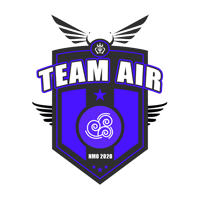
Announcement
FINAL | BUSINESS CASE - BCS 06
Business Adviser 2 Submission BCS 06
NMO 2020
Understanding the Optimal Mode of Frieght Shipment along with INCOTERMs
Submission Date & Time : 2020-04-26 04:16:41
Submitted By: Minakshi Goyal - Business Adviser 2 From Team Air
Assignment Taken
Define shipping method & International commercial terms (INCOTERMs) also advise which will be best in the interest of Ramalingam foods.Case Understanding
.....BCS Solution Summary
GBC Logo Global Business Consultancy Ltd. (GBC) is a pioneer in consultancy services, helping brands grow. It offers its services to various segments such as: 1. Start-Ups/MSME/MNCs 2. International/National Market Expansion 3. Product Portfolio Enhancement 4. Legal Consultancy 5. Project based Research & Analysis GBC has been helping companies for past 38 years and has a trusted client base including RBC Foods Ltd., Gymnasium Footwears Ltd., Sleepmore Polymers, Swastik Foundation to name a few. Global Business Consultancy was approached for international expansion by Ramalingam Foods (Tagline: Making Homemade Chefs Since 1965) which has a ready to cook product portfolio, predominantly South Indian food mix including dosa-idli instant mix powder, dhokla , gulab jamoon mix and filter coffee. GBC has decided the company to expand in Malaysia, Singapore and Indonesia of South-East Asia where there is huge south Indian population. The company would make greenfield expansion in Malaysia followed by export to Singapore (by road) and Indonesia (by waterways) from there. GBC has advised Ramalingam Foods to launch with current products at these three countries in this year with planned product portfolio enhancement over next two years. Ramalingam Foods will focus on R&D for product innovation (both authentic Indian and Indian themed foreign dish), marketing for extending reach cum brand building, world-class IT infrastructure for coping up with digital disruption, employee friendly productive HR policy. The regions for expansion have been chosen with a view to venture into new geographical areas as by means it already has a presence in Middle east, Southeast Asian countries and England.Solution
Organisation: RAMALINGAM FOODS Ltd.
Bank Account: HSBC Bank Ltd.
Permanent Account Number (PAN): ABCDE1234F
Importer-Exporter Code (IEC) Number: To Be Obtained
Selection of product: Ready to Eat Mixes
Selection of Markets: Malaysia, Singapore & Indonesia
Shipping Partner: Freightos (Covering the Custom Clearance, Transportation of
goods to/from ports & warehouse, Insurance of Freight)
WARHOUSE LOCATIONS
Malaysia: Johor [The manufacturing plant would also be in Johor,
Malaysia, which is at southern part of Malaysia and nearer to
sea port, also relatively closer to Singapore.]
Singapore: Sembawang
Indonesia: Bitung
SHIPPING METHOD
|
|
Malaysia |
Singapore |
Indonesia |
|
India (July 2019-September 2019) |
Marine |
Marine |
Marine |
|
Malaysia |
- |
Road |
Marine |
SHIPPING DETAILS (INDIA-MALAYSIA/SINGAPORE/INDONESIA)
|
Date |
HS Code |
Product Description |
Foreign Country |
Foreign Port |
India Port |
Value(INR) |
Std Qty(Kg)* |
Mode |
|
July 2019 |
62149090 |
Ready to Eat Mix ( Dry) Food Category |
Malaysia |
Tanjong Pelepas (MYTPP) |
Madras Sea |
299707782 |
121143 |
Sea |
|
July 2019 |
62149091 |
Ready to Eat Mix ( Dry) Bevrage Category |
Malaysia |
Tanjong Pelepas (MYTPP) |
Madras Sea |
15212626 |
6149 |
Sea |
|
August 2019 |
62149090 |
Ready to Eat Mix ( Dry) Food Category |
Singapore |
Port of Singapore (SGSGIN) |
Madras Sea |
57475968 |
23232 |
Sea |
|
August 2019 |
62149091 |
Ready to Eat Mix ( Dry) Bevrage Category |
Singapore |
Port of Singapore (SGSGIN) |
Madras Sea |
5959866 |
2409 |
Sea |
|
September 2019 |
62149090 |
Ready to Eat Mix ( Dry) Food Category |
Indonesia |
Port of Bitung |
Madras Sea |
33228294 |
13431 |
Sea |
|
September 2019 |
62149091 |
Ready to Eat Mix ( Dry) Bevrage Category |
Indonesia |
Port of Bitung |
Madras Sea |
2939112 |
1188 |
Sea |
*The above standard quantity has been calculated on the basis of demand estimation(monthly) by Global Business Consultancy and adding 10% buffer stock.
SAMPLE CARGO PLACEMENT

Why Chosen Sea Freight Over Other Shipping Methods? (India-Malaysia/Singapore/Indonesia & Malaysia-Indonesia)
Ocean freight is the most common mode of transport that importers and exporters use. In fact, a full 90% of everything is shipped by ocean freight and sea freight. The other international freight transport modes (courier, standard air freight, express air freight) are all faster, but they are also more expensive. Smaller shipments, and products with a high value, generally go by these other modes.
- Capacity and Value – One container can hold 10,000 beer bottles! And ocean freight is cheaper. As a rule of thumb, any shipment weighing more than 500 kg is too expensive for air freight.
- Physical properties - With physical properties such as buoyancy and limited friction, maritime transportation is the most effective mode to move large quantities of cargo over long distances.
- Fewer restrictions – International law, national law, carrier organization regulations and individual carrier regulations all play their part in defining and restricting what goods are considered dangerous for transport. Generally, more products restricted as air cargo than ocean freight, including: gases (e.g. lamp bulbs), all things flammable (e.g. perfume, Samsung Galaxy Note 7), toxic or corrosive items (e.g. batteries), magnetic substances (e.g. speakers), oxidizers and biochemical products (e.g. chemical medicines), and public health risks (e.g. untanned hides). For further information check out the Hazardous Material Table.
- Emissions – CO2 freight emissions from ocean freight is minuscule compared with air freight. For example, according to this research, 2 tonnes shipped for 5,000 kilometers by ocean freight will lead to 150 kg of CO2 emissions, compared to 6,605 kg of CO2 emissions by air freight.
Along with, Ramalingam Foods would be going with FCL (full container load) as
- LCL (less than container load) takes more time to deliver than an FCL shipment.
- There is an increased risk of damage, misplacement, and loss with LCL.
- LCL costs more per cubic meter.
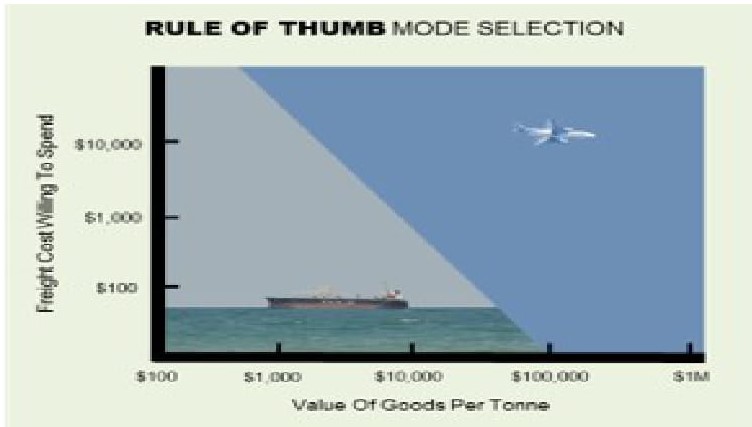
Fixed International Shipping Prices and Sea Freight Rates
For several decades now, world trade has been fueled by an increasingly abundant supply of cheap products that kept getting cheaper. So cheap, that actual ocean freight costs were almost irrelevant. But since 2012, there has been a dramatic fall in sea-freight rates – more than 75% on some ocean shipping routes. Part of this was due to plunging oil prices, but a lot has been market forces at play. Carriers went on a container ship spending spree at the same time that demand for container freight began leveling off. Demand isn’t forecasted to reach supply levels until 2022, by some estimates. That’s rough news for ocean carriers, but great news for importers and exporters.
Container sizes are chosen predominantly of two sizes namely 20' L x 8' W x 8.5' H also referred to as a "Twenty Footer" & 40' L x 8' W x 8.5' H also referred to as a "Forty Footer". There are other minor variants to this such as a "High Cube" which is one foot taller & a "Forty Five Footer" which is 45' in length. The exact box for Ramalingam Foods products would be chosen as per the consultation with the logistics partner.
FREIGHT CHARGES
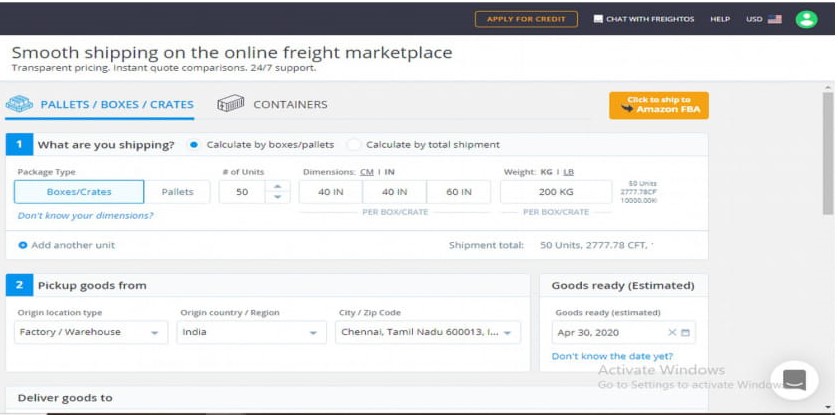
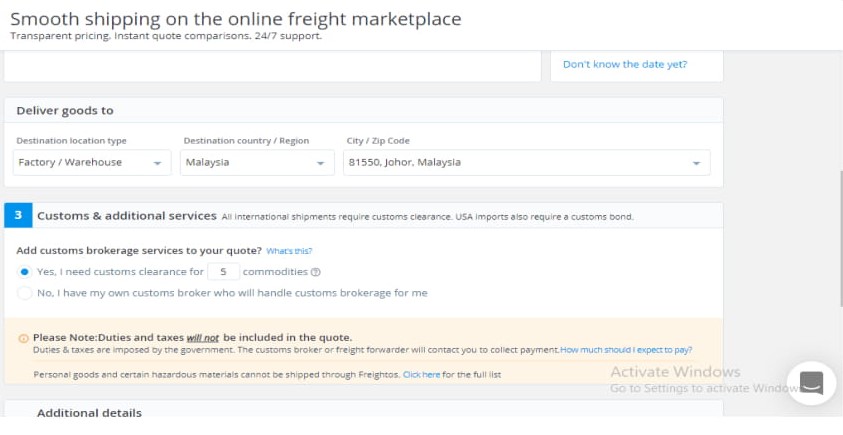
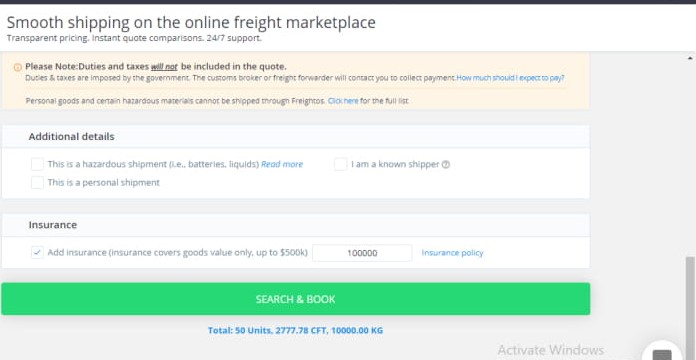
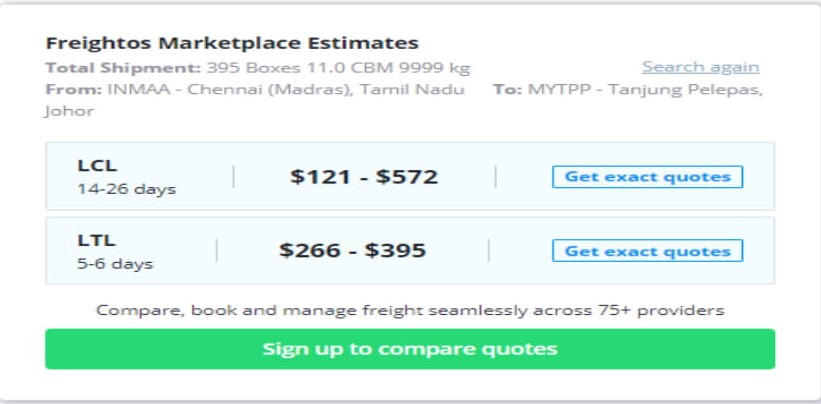
CURRENCY EXCHANGE/PAYMENTS & RECEIPTS AT PORTS
|
|
Malaysia |
Singapore |
Indonesia |
|
India (July 2019-September 2019) |
Malaysian Ringgit |
Singapore Dollar |
Indonesian Rupiah |
|
Malaysia |
- |
Malaysian Ringgit |
Malaysian Ringgit |
WHY ROADWAYS (Malaysia to Singapore)
Road freight is one of the most common of all modes of transportation. Road freight provides several advantages over other modes of transportation such as:
- Cost-effectiveness
- Quick and scheduled delivery
- Local, over border, long or short haul deliveries even in rural areas
- Flexible service
- Saving in Packing Cost compared to other modes
- Track and trace of cargo and truck
- Complete door-to-door service and it is one of the more economical means of transport.
The distance between the Port of Singapore and Johor is 73 Km which is efficient enough and considered as an ideal mode of shipment.
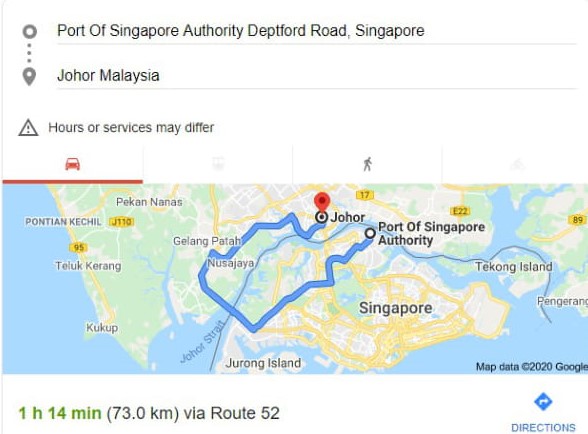
COMPARATIVE ANALYSIS OF MODES OF FREIGHT TRANSFER
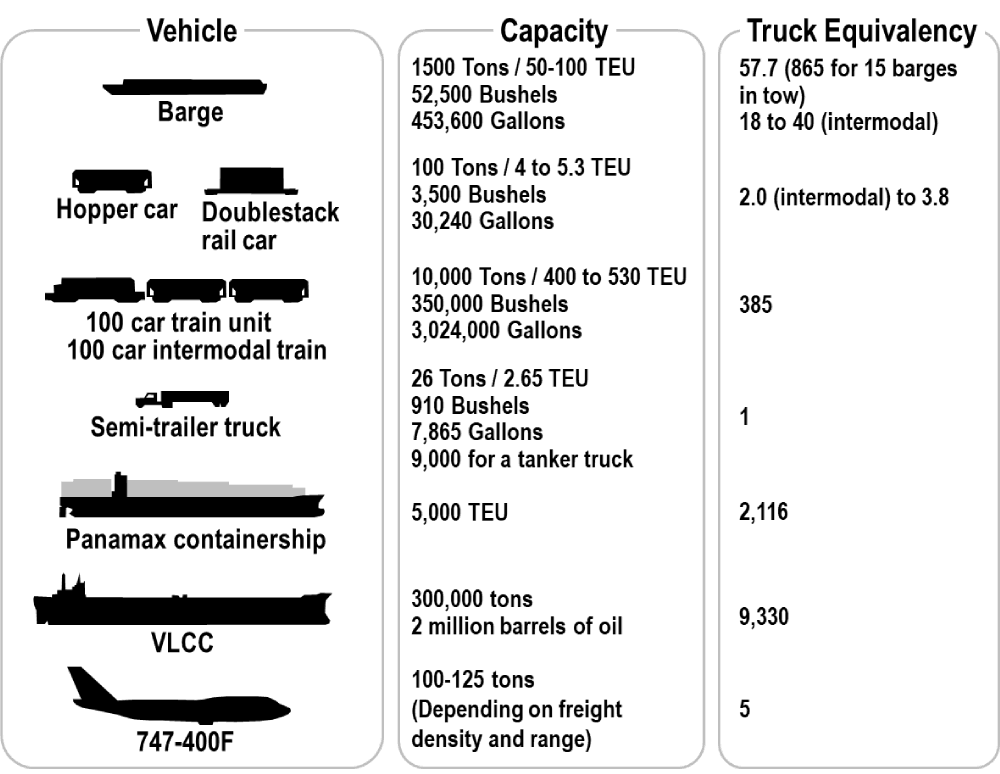
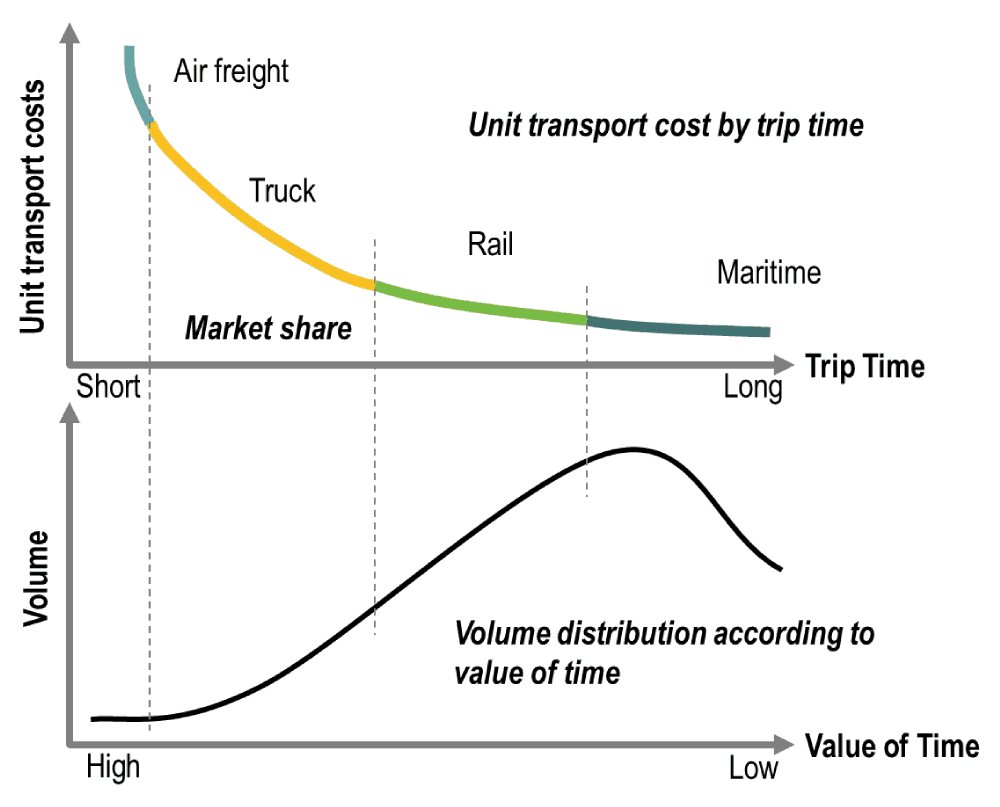
INCOTERMS
Freight INCOTERMs (International Commercial Terms) are the standard contract term used in sales contracts with importing/exporting to define responsibility and liability for shipment of the goods. In plain English – how far along the process will the supplier ensure that the goods are moved, and at what point does the buyer take over the shipment process.
INCOTERMs do not cover property rights, possible force majeure situations and breach of contract. Include of these within the contract of sale. Similarly, all INCOTERMs except the C terms do not assign responsibility for arranging insurance. Cargo insurance is, therefore, a separate cost for buyers.
INCOTERMs for Sea and Inland Waterway Transport (INDIA- Malaysia/Singapore/Indonesia & Malaysia-Indonesia)
FAS (Free Alongside Ship) - Seller clears the goods for export and delivers them when they are placed alongside the vessel at the named port of shipment. Buyer assumes all risks/costs for goods from this point forward.
FOB (Free on Board) - Seller clears the goods for export and delivers them when they are on board the vessel at the named port of shipment. Buyer assumes all risks and cost for goods from this moment forward.
CFR (Cost and Freight) - Seller clears the goods for export and delivers them when they are on board the vessel at the port of shipment. Seller bears the cost of freight to the named port of destination. Buyer assumes all risks for the goods from the time the goods have been delivered on board the vessel at the port of shipment.
CIF (Cost, Insurance, and Freight) - Seller clears the goods for export and delivers them when they are on board the vessel at the port of shipment. Seller bears the cost of freight and insurance to the named port of destination. The seller is required to purchase the minimum level of insurance under Clause C of the Institute Cargo Clauses. This requirement is unchanged from INCOTERMs 2010. Buyer is responsible for all costs associated with unloading the goods at the named port of destination and clearing goods for import. Risk passes from seller to buyer once the goods are on board the vessel at the port of shipment.
In case of Ramalingam Foods, CIF (Cost, Insurance, and Freight) would be optimal INCOTERM to be adapted for the India-Malaysia route as the brand is exporting its products to the Ramalingam Foods warehouse in Malaysia, which means that Ramalingam Foods is both the buyer and the seller and hence, all the costs would be borne by it. Also, for the other routes from India, this is a justified INCOTERM to be chosen as Ramalingam Foods is venturing in the new markets and thus risks are high. There could be various reasons a buyer could be reluctant to bear the expenses as borne by them as per other INCOTERMs, which could be:
- Risk involved in sale of goods of an new/unknown brand in market
- Additional Overhead expenses like warehouse, carriage freight charges, loading, etc.
- RF would itself would not want to risk and be assured by paying for freight insurance and the goods are delievered optimally.
INCOTERMs for Any Mode of Transport (Malaysia-Singapore)
EXW (Ex Works) - The seller fulfills its obligations by having the goods available for the buyer to pick up at its premises or another named place (i.e. factory, warehouse, etc.). Buyer bears all risk and costs starting when it picks up the products at the seller’s location or other named place until the products are delivered to its location. Seller has no obligation to load the goods or clear them for export.
FCA (Free Carrier) - The seller is responsible for either making the goods available at its own premises or at a named place. In either case, the seller is responsible for loading the goods on the buyer's transport and is responsible for delivery to the port and export clearance including security requirements. Risk transfers once the goods are loaded on the buyer’s transport.
CPT (Carriage Paid To) - Seller clears the goods for export and delivers them to the carrier or another person stipulated by the seller at a named place of shipment, at which point risk transfers to the buyer. Seller is responsible for the transportation costs associated with delivering goods to the named place of destination but is not responsible for procuring insurance.
CIP (Carriage and Insurance Paid To) - Seller clears the goods for export and delivers them to the carrier or another person stipulated by the seller at a named place of shipment, at which point risk transfers to the buyer. Seller is responsible for the transportation costs associated with delivering goods and procuring insurance coverage to the named place of destination.
DAP (Delivered at Place) - Seller clears the goods for export and bears all risks and costs associated with delivering the goods to the named place of destination not unloaded. DAP means the buyer is responsible for all costs and risks associated with unloading the goods and clearing customs to import the goods into the named country of destination.
DPU (Delivered at Place Unloaded) - Previously named Delivered at Terminal (DAT), this Incoterm has been renamed Delivered at Place Unloaded (DPU) because the buyer and/or seller may want the delivery of goods to occur somewhere other than a terminal.
DDP (Delivered Duty Paid) - DDP INCOTERMs means the seller bears all risks and costs associated with delivering the goods to the named place of destination ready for unloading and cleared for import.
As in case of INCOTERMS for Sea and Inland Waterway Transport, DDP holds to be the best choice for the same reasons, Ramalingam Foods being both the seller & buyer. The insurance is a major factor considered. Also, Ramalingam Foods would be acquiring all required permissions and legalities, hence would be deporting its personnel at the export import ports to ease our the freight process.
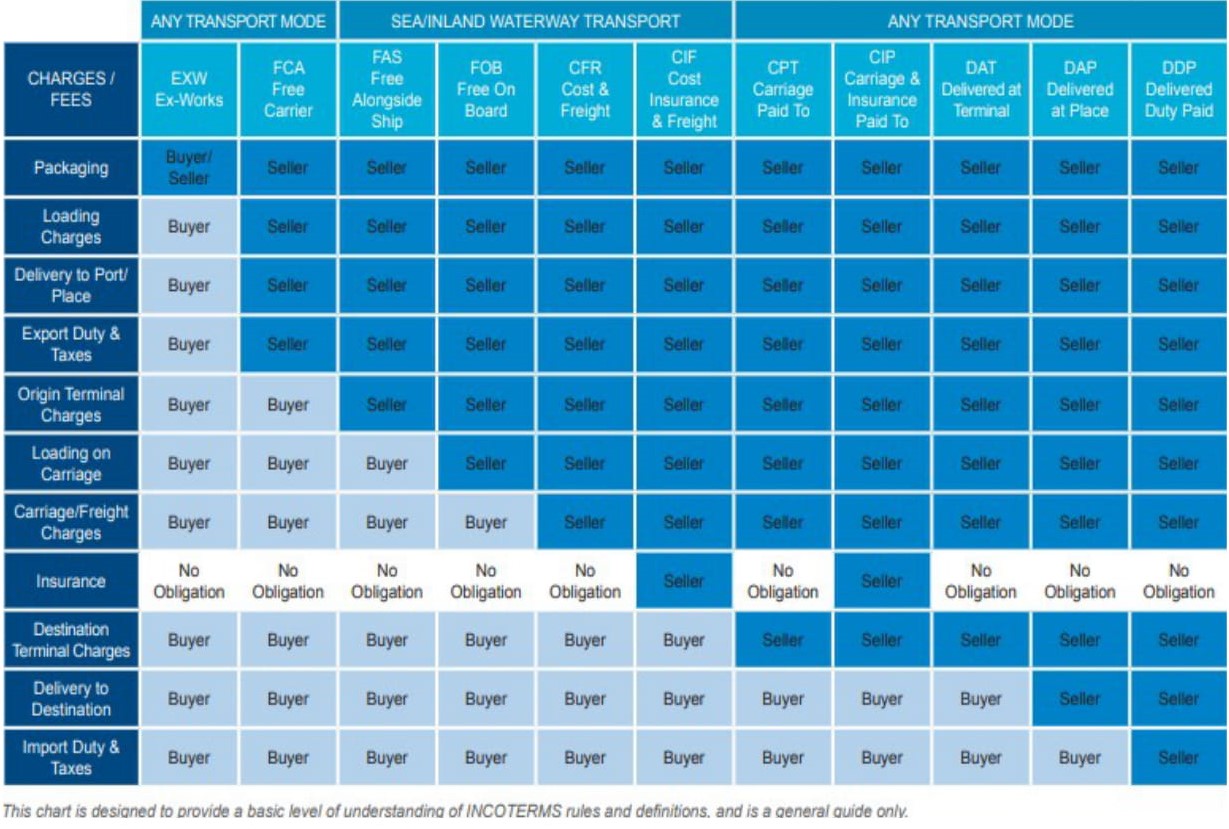
Conclusion
With the above mentioned solution, Global Business Consultancy has drafted an international market expansion plan for Ramalingam Foods Ltd. considering the minute details involved for the complete procedure. The statement is well supported by the reports of respective departments of Global Business Consultancy, that is, HR, Marketing, Finance, IT, General Management, Legal Advisory with a sheer management leader. The management principles used for the specific problem are: Order This is an important principle to be used in shipment process as, employees in an organization must have the right resources at their disposal so that they can function properly in an organization. In addition to social order (responsibility of the managers) the work environment must be safe, clean and tidy. The Degree of Centralization Centralization implies the concentration of decision making authority at the top management (executive board). Sharing authorities of decision making with lower levles is a careful decision as huge cost and risks are involved in terms of loss/damage of products, brand value, customer loss, etc.. Unity of Command The management principle ‘Unity of command’ means that an individual employee should receive orders from one manager and that the employee is answerable to that manager.Attached File Details
Participant
Minakshi Goyal
Swastik Foundation, Trustee
Team Sky BCS 06 Submission
Total Team Points: 63004.5
Team Air BCS 06 Submission
Total Team Points: 66715.5

















